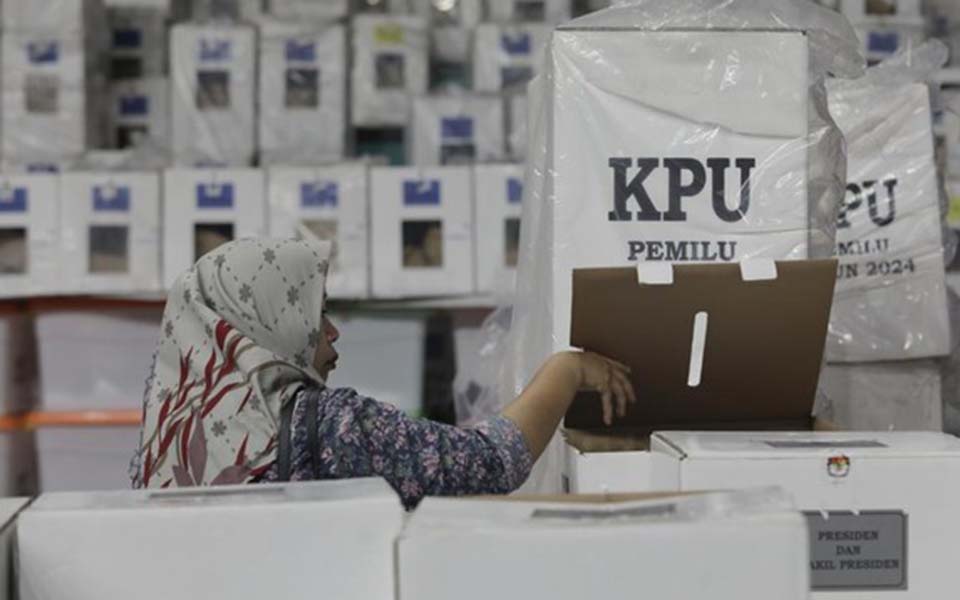[The following is a translation of a statement issued by the Women’s Defense Alliance (Aliansi Perempuan Menggugat, APM) which was issued on February 7.]
The 2004 elections will take place shortly. This is despite the lack of people’s trust in the political parties due to their failure to overcome problems of poverty, the eradication of corruption, the elimination of the military’s power, as well as the failure to address women’s oppression. Meanwhile the entire attention of the mass media has been directed to the coming elections. In the context of women’s oppression, militarism and neoliberal attacks have damaged the lives of women. In conflict regions of Indonesia such as Aceh and West Papua, Poso in Central Sulawasi, Ambon and so on military operations have forced thousands of women and children to become refugees in the own country, not to mention hundreds women who have become victims of sexual harassment.
Neoliberal policies such as cuts to subsidies, privatisation and so forth, which have been strongly promoted by the government of President Megawati and Vice President Hamzah Haz are a constant threat to women.
Cuts to subsidies which have led to the rise in the prices of basic goods are mostly endured by women. Inadequate health care and the high cost of the medicines are the main factor contributing to the high mortality rate in Indonesia.
Moreover, an enormous number of Indonesian women must work as a migrant workers because the government is unable to provide jobs for its people. Although migrant workers have made an enormous economic contribution to the nation, their rights are not protected by the government.
In addition to militarism and neoliberalism policies, the Megawati regime has promulgated anti-democratic legislation such as the marital law, new labor laws and the proposed law on pornography. All the laws mention above deny equal rights to women, legalising oppression and strengthens the patriarchic system.
Little concern is given by the political parties to the basic problems mentioned above, the political parties have only promised a 30% quota for women in the political parties [legislative candidate lists]. In fact, none of the political parties has been able to fulfill this. And even if there was a political party which is able to fulfill this requirement, without a concrete program to abolish militarism and to oppose neoliberalism, there will be no improvement in women’s lives. It will not answer the problem of women’s oppression.
Unfortunately, the women figures which have been chosen by the parties in power such as Golkar (a party which backed the dictatorship of former President Suharto), the Indonesian Democratic Party of Struggle (led by Megawati), the United Development Party, the Crescent Star Party and the Justice and Prosperity Party, have produced the anti-democratic policies, and it is obviously impossible to rely on them for any significant change. Significant change can only be attained if those forces who in power today are replaced by a new government made up of ordinary people with new programs, strategies, tactics and policies.
This change can only be attained through the pro-people forces. These forces will not just come from the women’s sector, but from the unification of the democratic movement along with students, farmers and workers who have proven their consistency in the struggle against militarism and neoliberalism. Therefore the immediate unification of the people’s struggle is a pre-condition for building a people’s movement which is able to defeat the political and economic system which is oppressing women.
Jakarta February 7, 2004
Raihan Diany, Coordinator Women’s Defence Alliance
The Women’s Defense Alliance is made up of:
- LS-ADI (Student for Action and Democracy)
- FNPBI (National Front for Indonesian Workers’ Struggle)
- MGP (Women’s Major Group)
- SEKAR (Kartini’s Weapon)
- PRD (People’s Democratic Party)
- ORPAD (Aceh Women Organization for Democracy)
- FAM UI (University of Indonesia Women’s Action Front)
- LBHR (People’s Legal Aid Foundation)
[Translated by Katarina Pujiastuti.]















